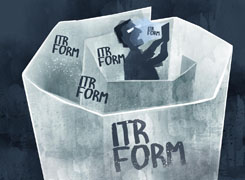Ramalingam Kalirajan |8319 Answers |Ask -Follow
Mutual Funds, Financial Planning Expert - Answered on May 15, 2024
He has an MBA in finance from the University of Madras and is a certified financial planner.
He is the director and chief financial planner at Holistic Investment, a Chennai-based firm that offers financial planning and wealth management advice.... more

Hi Sir, I am 38 year old currently working in an MNC company with income of 1.80 lakhs per month. However, I am having debts close to 1.3cr with most of my monthly income going towards EMI. I have property worth 1.6cr in which I am living in. Off late I am struggling managing my finances. I have 2 kids (10yr/8yr) old. Should I continue to pay EMIs & wait for them to end after 10 years or just sell the property to start off fresh. Your suggestions will be of great help.
Acknowledging Your Challenges
Facing a significant debt burden while managing a family and household expenses can indeed be stressful. However, taking proactive steps now can alleviate financial strain in the long run.
Assessing Your Options
Continuing EMIs
Continuing to pay EMIs on your existing loans may seem like a daunting task, especially with a substantial portion of your income allocated towards debt repayment. While it ensures you retain ownership of your property, it prolongs your financial stress and limits your ability to build wealth elsewhere.
Selling the Property
Selling your property to settle debts and start afresh is a viable option worth considering. It provides immediate relief from the burden of EMIs and allows you to redirect funds towards debt reduction and building financial security for your family's future.
Analyzing the Pros and Cons
Continuing EMIs:
Pros: Retain ownership of the property, potentially benefiting from future appreciation.
Cons: Continued financial strain, limited flexibility in managing other financial goals, prolonged debt repayment.
Selling the Property:
Pros: Immediate debt relief, opportunity to start anew with reduced financial obligations, potential to invest surplus funds for wealth creation.
Cons: Loss of ownership of the property, potential impact on family's living arrangements, need for careful planning to maximize proceeds from the sale.
Considering Family Needs
Education and Future Planning
As a parent, securing your children's future education and well-being is paramount. Evaluating how your financial decisions align with their long-term needs is crucial in making informed choices.
Lifestyle and Comfort
Maintaining a comfortable standard of living for your family, especially during their formative years, requires careful financial management. Balancing debt repayment with providing for your family's present needs is essential.
Crafting a Financial Strategy
Consultation with Experts
Seeking guidance from financial professionals, including Certified Financial Planners, can provide valuable insights and personalized recommendations tailored to your specific circumstances.
Creating a Financial Plan
Developing a comprehensive financial plan that prioritizes debt reduction, savings, and investment goals can pave the way towards financial freedom and stability.
Conclusion
In conclusion, whether to continue paying EMIs or sell the property requires a thorough assessment of your financial goals, obligations, and family needs. By weighing the pros and cons and seeking expert advice, you can make an informed decision that sets you on the path towards financial well-being.
Best Regards,
K. Ramalingam, MBA, CFP,
Chief Financial Planner,
www.holisticinvestment.in
You may like to see similar questions and answers below
Harsh Roongta | Answer |Ask -Follow
Answered on Dec 24, 2019
Ramalingam Kalirajan |8319 Answers |Ask -Follow
Mutual Funds, Financial Planning Expert - Answered on May 13, 2024
Ramalingam Kalirajan |8319 Answers |Ask -Follow
Mutual Funds, Financial Planning Expert - Answered on Jun 21, 2024
Milind Vadjikar |1206 Answers |Ask -Follow
Insurance, Stocks, MF, PF Expert - Answered on Dec 23, 2024
Radheshyam Zanwar |1599 Answers |Ask -Follow
MHT-CET, IIT-JEE, NEET-UG Expert - Answered on May 05, 2025
Radheshyam Zanwar |1599 Answers |Ask -Follow
MHT-CET, IIT-JEE, NEET-UG Expert - Answered on May 05, 2025

EEE (Electrical and Electronics Engineering) at IIIT Gwalior (ABV-IIITM) can be a decent choice. But if you're strictly interested in core electrical engineering, other colleges (like NITs) might be a better option because not many EEE-core companies visit the campus in comparison to CS/IT branches. Finally, if your interest is strictly in core EEE, IIIT Gwalior might not offer as many labs or core recruiters as older NITs or IITs with stronger electrical departments.
Follow me if you like the reply. Thanks
Radheshyam
If not followed, pl follow and like. Thanks
Radheshyam Zanwar |1599 Answers |Ask -Follow
MHT-CET, IIT-JEE, NEET-UG Expert - Answered on May 05, 2025
Prof Suvasish Mukhopadhyay |612 Answers |Ask -Follow
Career Counsellor - Answered on May 05, 2025
Prof Suvasish Mukhopadhyay |612 Answers |Ask -Follow
Career Counsellor - Answered on May 05, 2025
Mihir Tanna |1052 Answers |Ask -Follow
Tax Expert - Answered on May 05, 2025
Samraat Jadhav |2269 Answers |Ask -Follow
Stock Market Expert - Answered on May 05, 2025
Samraat Jadhav |2269 Answers |Ask -Follow
Stock Market Expert - Answered on May 05, 2025
Samraat Jadhav |2269 Answers |Ask -Follow
Stock Market Expert - Answered on May 05, 2025
Ramalingam Kalirajan |8319 Answers |Ask -Follow
Mutual Funds, Financial Planning Expert - Answered on May 05, 2025

























